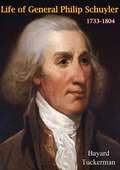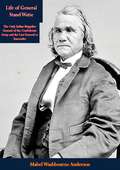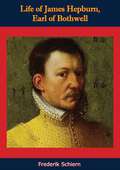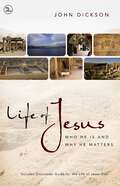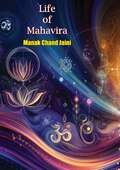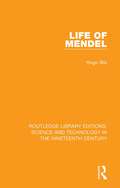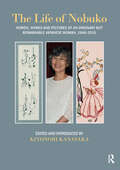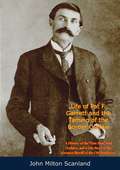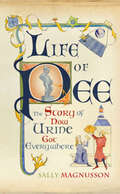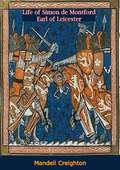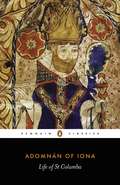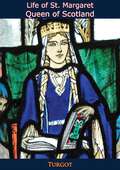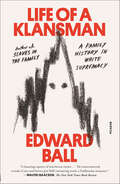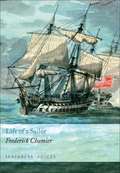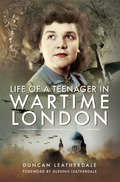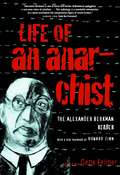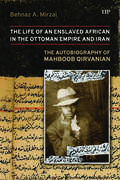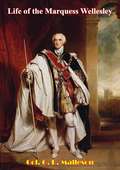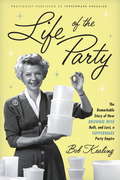- Table View
- List View
Life of General Philip Schuyler, 1733-1804
by Bayard TuckermanPhilip John Schuyler served as a major general in the Continental Army during the American Revolution and was a member of the First United States Senate. Schuyler played a key role in the American victory at the Battle of Saratoga, as well as in earlier campaigns including the Invasion of Canada, and the Battles of Lake Champlain and Fort Ticonderoga. Coming from a family deeply rooted in the Dutch-influenced culture of New York, Schuyler was a member of the civic and social elite representing New York in the Continental Congress and the United States Senate.-Mount Vernon.org
Life of General Stand Watie: The Only Indian Brigadier General of the Confederate Army and the Last General to Surrender
by Mabel Washbourne AndersonWatie was born in 1806 near Calhoun Georgia. Watie left for the Indian Territory in 1835 and was one of the Cherokee leaders before the Civil War. He was the only Native American Confederate General commanding the Confederate Indian Cavalry of the Army of the Trans-Mississippi. Watie was the highest ranked Native American in the Confederate army and renowned for his leadership in the Battle of Pea Ridge and other battles. He also was the last Confederate general to surrender, three months after Lee at Appomattox. Watie was the last Confederate General to surrender in June 1865. The author was the grandniece of Stand Watie.
Life of James Hepburn, Earl of Bothwell
by Frederik Schiern"Life of James Hepburn, Earl of Bothwell" by Frederik Schiern offers a compelling and meticulously researched biography of one of the most controversial figures in Scottish history. James Hepburn, the 4th Earl of Bothwell, is best known for his tumultuous relationship with Mary, Queen of Scots, and his role in the political intrigues of 16th-century Scotland.Schiern's work delves deeply into the life and times of Bothwell, tracing his rise to power and his eventual downfall. Through careful examination of historical documents and contemporary accounts, Schiern paints a vivid picture of Bothwell's early life, his ambitious nature, and his strategic maneuvers within the volatile Scottish court. The book provides a detailed account of his involvement in key events, including his controversial marriage to Mary, Queen of Scots, following the mysterious death of her husband, Lord Darnley.Schiern explores Bothwell's character with a balanced perspective, acknowledging his strengths as a capable leader and warrior while also scrutinizing his flaws and the controversies that surrounded him. The biography sheds light on Bothwell's motivations, his alliances, and the fierce opposition he faced from both political rivals and foreign powers.The narrative also examines the broader context of 16th-century Scotland, offering insights into the political, social, and religious dynamics that influenced Bothwell's actions and fate. Schiern's scholarly approach provides a nuanced understanding of the complexities of this period, making the book an invaluable resource for historians and enthusiasts of Scottish history."Life of James Hepburn, Earl of Bothwell" is a captivating read that brings to life the dramatic story of a man who left an indelible mark on Scottish history. Schiern's thorough research and engaging writing make this biography a must-read for anyone interested in the turbulent era of Mary, Queen of Scots, and the enigmatic figure of James Hepburn, Earl of Bothwell.
Life of Jesus: Who He Is and Why He Matters
by John DicksonWhat really happened back in the first century, in Jerusalem and around the Sea of Galilee, that changed the shape of world history? Who is this figure that emerges from history to have a profound impact on culture, ethics, politics, and philosophy? Join historian John Dickson on this journey through the life of Jesus. This book, which features a self-contained discussion guide for use with Life of Jesus DVD, will help you and your friends dig deeper into what is known about Jesus’ life and why it matters. “John Dickson has done a marvelous job of presenting the story of Jesus, and the full meaning of that story, in a way that is both deeply faithful to the biblical sources and refreshingly relevant to tomorrow's world and church. I strongly recommend this study to anyone who wants to re-examine the deep historical roots of Christian faith and to find them as life-giving as they ever were.”—Tom Wright
Life of Mahavira
by Manak Chand Jaini“The Life of Mahavira is a comprehensive biography of the founder of Jainism, Mahavira. Written by Manak Chand Jaini, a prominent scholar of Jainism, the book provides a detailed account of Mahavira's life, teachings, and legacy. The book is divided into several chapters, each of which focuses on a different aspect of Mahavira's life. The first chapter provides an introduction to Jainism and its history, while the second chapter delves into the life of Mahavira before he became a spiritual leader. The third chapter describes Mahavira's spiritual journey and his attainment of enlightenment, while the fourth chapter explores his teachings and philosophy. The remaining chapters of the book focus on various aspects of Mahavira's life, including his interactions with other religious leaders, his relationships with his disciples, and his travels throughout India. The book also includes a detailed analysis of Mahavira's legacy and the impact of his teachings on Jainism and Indian society as a whole. Overall, The Life of Mahavira is an essential read for anyone interested in the history and philosophy of Jainism, as well as those interested in the life of one of India's most revered spiritual leaders.”-Print ed.
Life of Mendel (Routledge Library Editions: Science and Technology in the Nineteenth Century #3)
by Hugo IltisFirst published in 1932. The widespread influence of Gregor Johann Mendel’s work and his own remarkable destiny combine to arouse interest in the personality and the life of this investigator who, little known in his lifetime, was one of the pioneers of science. This comprehensive biography of the life and work of Mendel will be of great interest to historians and scientists.
Life of Nobuko: Words, Works and Pictures of an Ordinary but Remarkable Japanese Woman, 1946-2015
by Kiyonori Kanasaka Nicholas PertweeKiyonori Kanasaka, a distinguished geographer at Kyoto University, is widely recognized as Japan’s leading researcher on the Victorian traveller Isabella Bird. He has published extensively in Japanese on the subject, including a full annotated translation of the original two-volume edition of Unbeaten Tracks. He is known worldwide for his ‘Twin Time Travel’ photographic exhibition, shown in many countries – presenting Bird’s descriptions of what she wrote about in her books in juxtaposition with illustrations of the present.
Life of Pat F. Garrett and the Taming of the Border Outlaw: A History of the “Gun Men” And Outlaws, and a Life-Story of the Greatest Sheriff of the Old Southwest
by John Milton ScanlandPatrick Floyd Jarvis Garrett (1850-1908) was an American Old West lawman, bartender and customs agent who became renowned for killing Billy the Kid. He was the sheriff of Lincoln County, New Mexico as well as Doña Ana County, New Mexico.Life of Pat F. Garrett and the Taming of the Boarder Outlaw tells the story of the sheriff who pursued and killed Billy the Kid. Authored by John Milton Scanland, a newspaperman who knew both Pat F. Garrett and New Mexico well, the book was written shortly after Pat F. Garrett’s own slaying in 1908.A thrilling read, no collection of Western Outlaw material is complete without it.
Life of Pee: The Story of How Urine Got Everywhere
by Sally MagnussonA frank and humorous encyclopedic history of the forgotten life of urine and its many uses in society.Alchemists sought gold in it. David Bowie refrigerated it to ward off evil. In the trenches of Ypres soldiers used it as a gas mask, whereas modern-day terrorists add it to home-made explosives. All the Fullers, Tuckers and Walkers in the phonebook owe their names to it, and in 1969 four bags for storing it were left on the surface of the moon.Bought and sold, traded and transported, even carried to work in jugs, urine has made bread rise, beer foam and given us gunpowder, stained glass, Robin Hood’s tights, and Vermeer’s Girl With A Pearl Earring.And we do produce an awful lot of it. Humans alone make almost enough to replace the entire contents of Loch Lomond every year. Add the incalculable volume contributed by the rest of the animal kingdom and it might soon displace a small ocean. No wonder it gets everywhere.In Life of Pee Sally Magnusson unveils the secret history of civilization’s most unsavory and unsung hero, and discovers how our urine footprint is just as indelible as our carbon one.
Life of Prince Metternich
by Col. G. B. MallesonOriginally published in 1888, this is a short biography of the life of Prince Klemens Wenzel von Metternich (15 May 1773 - 11 June 1859), a politician and statesman of Rhenish extraction and one of the most important diplomats of his era, serving as the Austrian Empire's first Foreign Minister from 1809 and then Chancellor from 1821. He was a great diplomat: crafty, manipulative, and single-minded in his determination to overthrow Napoleon and his revolutionary ideals and to re-establish the European monarchical system.Here, British Colonel G. B. Malleson describes how the charming, aristocratic Metternich devoted countless hours to winning Napoleon's trust and to buying time for his country, until a re-armed Austria, at the head of the Sixth Coalition, was able to defeat the still-formidable Corsican. From 1815 until his downfall amid the revolutions of 1848, notes Malleson, Metternich devoted "all his power, all his influence, all his untiring energy, to the forging of new fetters for the human race."This compact but succinct title makes an important addition to your history collection.
Life of R Wagner Vol 2
by Ernest NewmanIn the vast literature on Richard Wagner, Ernest Newman's classic four-volume Life remains unsurpassed.Volume II carries the story from 1848 to 1860. It describes the important, formative years in Wagner's life and reconstructs his role in the Dresden rising of 1849. Newman also discusses the changes that the Ring poem underwent during this period and illuminates Wagner's relations with his wife Minna, his mentor Liszt, and his circle in Zürich.
Life of R Wagner Vol 3
by Ernest NewmanIn the vast literature on Richard Wagner, Ernest Newman's classic four-volume Life remains unsurpassed.Volume III covers the years 1859-66 including the Tannhäuser debacle in Paris, the crisis with Minna, the first production of Tristan und Isolde and the flight from Munich.
Life of R Wagner Vol 4
by Ernest NewmanErnest Newman's four-volume Life of Wagner, originally published between 1933 and 1947, remains a classic work of biography. The culmination of forty years' research on the composer and his works (Newman's first Study of Wagner was first published in 1899), these books present a detailed portrait of perhaps the most influential, the most controversial and the most frequently reviled composer in the whole history of western music. Newman was aware that no biography can ever claim to be complete or completely accurate: 'The biographer can at no stage hope to have reached the final truth. All he can do is to make sure that whatever statement he may make, whatever conclusion he may come to, shall be based on the whole of the evidence available at the time of writing.' In this aim he triumphantly succeeds.Volume IV completes the story from 1866 to Wagner's death in 1883. It covers the composition of Die Meistersinger and Parsifal, the completion of the Ring, Wagner's marriage to Cosima Liszt von Bülow, and the building of Bayreuth.
Life of Richard Wagner, Volume 1: 1813-1848
by Ernest NewmanFrom renowned music critic and musicologist Ernest Newman comes the first of four volumes chronicling the life of legendary German composer Richard Wagner. This first volume takes us through the early years of Richard's life: his birth in Leipzig; his childhood in Dresden and the sparks of his interest in music, opera, and theater; his musical education, including his studies at University of Leipzig; his early career, accompanied by his first compositions and first money troubles; and his six years spent in Dresden, including his involvement in left-wing politics. Originally published between 1933 and 1947, Newman's The Life of Richard Wagner, Volumes I-IV remains a classic work of biography. The culmination of forty years' research on the composer and his works, these books present a detailed portrait of perhaps the most influential, the most controversial and the most frequently reviled composer in the whole history of western music. Newman was aware that no biography can ever claim to be complete or completely accurate: "The biographer can at no stage hope to have reached the final truth. All he can do is to make sure that whatever statement he may make, whatever conclusion he may come to, shall be based on the whole of the evidence available at the time of writing." In this aim he triumphantly succeeds.
Life of Simon de Montford Earl of Leicester
by Mandell CreightonTHE name of SIMON DE MONTFORT is connected in English history with the rise of Parliament to political power. What exact amount of credit he deserves in this matter will be seen from a survey of the facts of the case. But Simon de Montfort, apart from this, is a most notable character in English history. In times of difficulty, where there was a dearth of leaders, he showed himself a man of rare ability, of keen political foresight, of lofty purpose, and of resolute mind. Though a foreigner by birth, he saw more clearly than any native Englishman the hidden genius of the old English institutions. Though hated at first as an alien and an adventurer, he so won his way to English hearts that the people loved him as few men have ever been loved in England, and after his death adored him as a saint and martyr. The man of whom this is true deserves a fuller recognition among England’s heroes than he has yet received.Moreover, the times in which Earl Simon lived are amongst the most remarkable in the history of Europe. A great spiritual movement, second only in importance to what we call the Reformation, was passing over Christendom. The followers of St. Francis and St. Dominic carried Christian morality among the lower classes, and awoke a new intelligence wherever they went. A greater sense of spiritual freedom and of the dignity of man began to prevail amongst the people.
Life of St Columba
by Adomnan of IonaFounding father of the famous monastery on the island of Iona, a site of pilgrimage ever since his death in 597, St Columba was born into one of the ruling families in Ireland at a time of immense expansion for the Irish Church. This account of his life, written by Adomnán - the ninth abbot of Iona, and a distant relative of St Columba - describes his travels from Ireland to Scotland and his mission in the cause of Celtic Christianity there. Written 100 years after St Columba's death, it draws on written and oral traditions to depict a wise abbot among his monks, who like Christ was capable of turning water into wine, controlling sea-storms and raising the dead. An engaging account of one of the central figures in the 'Age of Saints', this is a major work of early Irish and Scottish history.
Life of St. Margaret, Queen of Scotland
by TurgotAn early 12th century manuscript written by Turgot, Bishop of St. Andrews, based on the text printed in the Acta Sanctorum, Vol. II, 101. Translated from the Latin by Rev. Father William Forbes-Leith, SJ.Saint Margaret of Scotland, also known as Margaret of Wessex, was an English princess and a Scottish queen. Margaret was sometimes called "The Pearl of Scotland". Born in the Kingdom of Hungary to the expatriate English prince Edward the Exile, Margaret and her family returned to England in 1057. Following the death of King Harold II at the Battle of Hastings in 1066, her brother Edgar Ætheling was elected as King of England but never crowned. After she and her family fled north, Margaret married Malcolm III of Scotland by the end of 1070.Margaret was a very pious Christian, and among many charitable works she established a ferry across the Firth of Forth in Scotland for pilgrims travelling to St Andrews in Fife, which gave the towns of South Queensferry and North Queensferry their names. Margaret was the mother of three kings of Scotland, or four, if Edmund of Scotland (who ruled with his uncle, Donald III) is counted, and of a queen consort of England. According to the Vita S. Margaritae (Scotorum) Reginae (Life of St. Margaret, Queen (of the Scots)), attributed to Turgot of Durham, Margaret died at Edinburgh Castle in Edinburgh, Scotland in 1093, merely days after receiving the news of her husband's death in battle.
Life of a Klansman: A Family History in White Supremacy
by Edward Ball"A haunting tapestry of interwoven stories that inform us not just about our past but about the resentment-bred demons that are all too present in our society today . . . The interconnected strands of race and history give Ball’s entrancing stories a Faulknerian resonance." —Walter Isaacson, The New York Times Book ReviewA 2020 NPR staff pick | One of The New York Times' thirteen books to watch for in August | One of The Washington Post's ten books to read in August | A Literary Hub best book of the summer| One of Kirkus Reviews' sixteen best books to read in AugustThe life and times of a militant white supremacist, written by one of his offspring, National Book Award–winner Edward BallLife of a Klansman tells the story of a warrior in the Ku Klux Klan, a carpenter in Louisiana who took up the cause of fanatical racism during the years after the Civil War. Edward Ball, a descendant of the Klansman, paints a portrait of his family’s anti-black militant that is part history, part memoir rich in personal detail.Sifting through family lore about “our Klansman” as well as public and private records, Ball reconstructs the story of his great-great grandfather, Constant Lecorgne. A white French Creole, father of five, and working class ship carpenter, Lecorgne had a career in white terror of notable and bloody completeness: massacres, night riding, masked marches, street rampages—all part of a tireless effort that he and other Klansmen made to restore white power when it was threatened by the emancipation of four million enslaved African Americans. To offer a non-white view of the Ku-klux, Ball seeks out descendants of African Americans who were once victimized by “our Klansman” and his comrades, and shares their stories.For whites, to have a Klansman in the family tree is no rare thing: Demographic estimates suggest that fifty percent of whites in the United States have at least one ancestor who belonged to the Ku Klux Klan at some point in its history. That is, one-half of white Americans could write a Klan family memoir, if they wished.In an era when racist ideology and violence are again loose in the public square, Life of a Klansman offers a personal origin story of white supremacy. Ball’s family memoir traces the vines that have grown from militant roots in the Old South into the bitter fruit of the present, when whiteness is again a cause that can veer into hate and domestic terror.
Life of a Sailor: By Capt. Frederick Chamier, R. N. (Seafarers' Voices)
by Frederick ChamierChamier was a Royal Navy officer, who like his exact contemporary Captain Marryat is best remembered for a series of naval novels. The Life of a Sailor was his first publication and is usually catalogued as fiction, which may be a tribute to Chamiers story-telling skills but it is wrong the book is an exact account of his naval career, with every personality, ship and event he describes corroborated by his service records. By the time he went to sea in 1809, the heroic age of Nelson was over, but the war was far from won, and he was to see a lot of action, from anti-slavery patrols off Africa to punitive raids on the American coast during the War of 1812.His descriptions of the latter were to prove highly controversial. Like many liberal officers, he deplored the strategy of bringing the war to the civilian population, and the book was much criticised by more senior naval officers for saying so. Chamier represents a new generation of post-Nelsonic naval officer, more gentlemanly, better educated and perhaps more open-minded he certainly got on well with Lord Byron, whom he met in Constantinople and his sympathies generally look forward to the Victorian age. He was too young to rise to high rank, and after the Napoleonic War, like many others, he was condemned to a life on half-pay and perhaps forced into a literary career, but out of it came one of the eras most authentic accounts of a junior officers naval service.
Life of a Slave on a Southern Plantation
by Stephen CurrieThis book describes the lives of slaves on southern plantations, including information on family life, food and housing, work, play, punishment, and escape. Dozens of quotations from plantation owners and visitors, abolitionists, and especially the slaves themselves help bring the period to life for readers.
Life of a Teenager in Wartime London
by Duncan LeatherdaleLife in wartime London evokes images of the Blitz, of air-raid shelters and rationing, of billeted soldiers and evacuated children. These are familiar, collective memories of what life was like in wartime London, yet there remains an often neglected area of our social history: what was life like for teenagers and young people living in London during the Second World War?While children were evacuated and many of their friends and family went to fight, there were many who stayed at home despite the daily threat of air raids and invasion. How did those left behind live, work and play in the nation's capital between 1939 and 1945? Using the diary entries of nineteen-year-old trainee physiotherapist Glennis 'Bunty' Leatherdale, along with other contemporary accounts, Life of a Teenager in Wartime London is a window into the life of a young person finding their way in the world. It shows how young people can cope no matter the dangers they face, be it from bombs or boys, dances or death.
Life of an Anarchist: The Alexander Berkman Reader
by Alexander BerkmanAlexander Berkman was a twentieth-century American revolutionary. Like the abolitionist John Brown before him, Berkman was hugely idealistic, ready to go to the furthest extreme of self-sacrifice and violence on behalf of justice and civil rights. He decided to assassinate industrialist Henry Clay Frick after reading in the newspaper that Pinkertons hired by Frick had opened fire on the Homestead strikers, killing men, women, and children. Berkman's bungled attempt cost him fifteen years in a federal penitentiary. Upon his release, he became an effective agitator against conscription and was again imprisoned and eventually deported to Russia, where he saw at first hand the early days of Bolshevism. Berkman's writings remain a lasting and impassioned record of intense political transformation. Featuring a new introduction by Howard Zinn, Life of an Anarchist contains Prison Memoirs of an Anarchist, Berkman's account of his years in prison; The Bolshevik Myth, his eyewitness account of the early days of the Russian Revolution; and The ABC of Anarchism, the classic text on the nature of anarchism in the twentieth century. Also included are a selection of letters between Berkman and his lifelong companion Emma Goldman, and a generous sampling from Berkman's other publications.
Life of an Enslaved African in the Ottoman Empire and Iran: The Autobiography of Mahboob Qirvanian
by Mahboob QirvanianThe Life of an Enslaved African in the Ottoman Empire and Iran is a poignant and compelling account of one man’s journey through struggle, resilience, and unimaginable suffering. In the early twentieth century, Mahboob Qirvanian recorded his personal experiences of forced migration and enslavement as he navigated his path from captivity in Africa to full citizenship and a reconstructed identity in Iran. Written in Persian and Arabic, this remarkable autobiography serves as a powerful testament to Mahboob’s endurance, suffering, and ultimate transformation.Through insightful analysis, Behnaz A. Mirzai places Mahboob’s narrative – the only known account by a former African slave in Iran – within the context of the political upheavals of the Constitutional Revolution in Iran and the Tanzimat reforms of the Ottoman Empire. This book not only sheds light on Mahboob’s personal story and the historical injustices of slavery but also engages with broader themes of displacement, identity, and social justice. In doing so, it invites readers to reflect on the enduring legacies of racial inequality and the ongoing struggles for freedom and dignity in the modern world.
Life of the Marquess Wellesley
by Col. G. B. MallesonOriginally published in 1895, this newer edition of Colonel Malleson's book chronicling the life of the Richard Cowley Wesley, 1st Marquess Wellesley KG (1760-1842) successfully 'brings out the salient points of character of the great man, indicates his many merits, and makes no attempt to slur over his failings.'Well-received on its first publication, this compact but succinct title makes an important addition to your history collection.
Life of the Party: The Remarkable Story of How Brownie Wise Built, and Lost, a Tupperware Party Empire
by Bob KealingThe incredible story of Brownie Wise, the Southern single mother--and postwar #Girlboss--who built, and lost, a Tupperware home-party empireBefore Mary Kay, Martha Stewart, and Joy Mangano, there was Brownie Wise, the charismatic Tupperware executive who converted postwar optimism into a record-breaking sales engine powered by American housewives. In Life of the Party, Bob Kealing offers the definitive portrait of Wise, a plucky businesswoman who divorced her alcoholic husband, started her own successful business, and eventually caught the eye of Tupperware inventor, Earl Tupper, whose plastic containers were collecting dust on store shelves. The Tupperware Party that Wise popularized, a master-class in the soft sell, drove Tupperware's sales to soaring heights. It also gave minimally educated and economically invisible postwar women, including some African-American women, an acceptable outlet for making their own money for their families--and for being rewarded for their efforts. With the people skills of Dale Carnegie, the looks of Doris Day, and the magnetism of Eva Peron, Wise was as popular among her many devoted followers as she was among the press, and she become the first woman to appear on the cover of BusinessWeek in 1954. Then, at the height of her success, Wise's ascent ended as quickly as it began. Earl Tupper fired her under mysterious circumstances, wrote her out of Tupperware's success story, and left her with a pittance. He walked away with a fortune and she disappeared--until now. Originally published as Tupperware Unsealed by the University Press of Florida in 2008--and optioned by Sony Pictures, with Sandra Bullock attached to star--this revised and updated edition is perfectly timed to take advantage of renewed interest in this long-overlooked American business icon.From the Hardcover edition.
